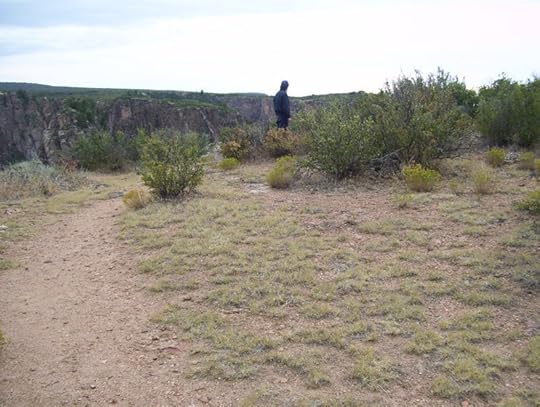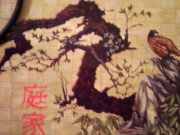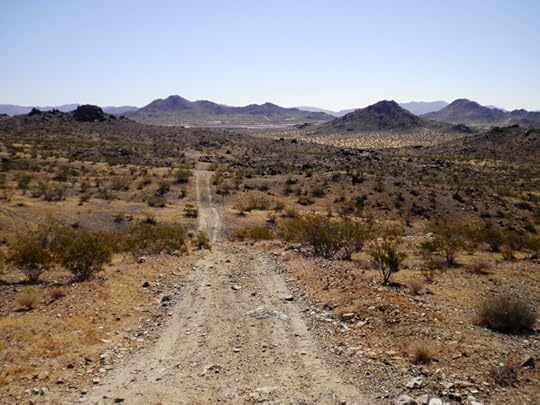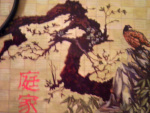Pat Bertram's Blog, page 284
January 5, 2012
Grief: Looking at the World Through a Camera Lens
 My publisher suggested adding photos to my soon-to-be-published book about grief, and I jumped at the chance. I'd recently read David Ebright's YA novel Reckless Endeavor, and was impressed by how much veracity just a couple of photos gave his story, so I was glad of the opportunity to do the same for my book. The only problem is, I have almost no photos of me and my life mate. We simply did not take photos — not of the places we lived, and not of each other. It's not that we weren't visually inclined, it's that we lived in the moment. If you take a photo of the moment, the shoot becomes the moment and you lose the moment itself.
My publisher suggested adding photos to my soon-to-be-published book about grief, and I jumped at the chance. I'd recently read David Ebright's YA novel Reckless Endeavor, and was impressed by how much veracity just a couple of photos gave his story, so I was glad of the opportunity to do the same for my book. The only problem is, I have almost no photos of me and my life mate. We simply did not take photos — not of the places we lived, and not of each other. It's not that we weren't visually inclined, it's that we lived in the moment. If you take a photo of the moment, the shoot becomes the moment and you lose the moment itself.
A couple of years before he died, I was gifted with a digital camera, and I took hundreds of photos of trees, animal tracks, a cattle drive, some yaks in a nearby field, (well, weeds) along the lane where I walked. It helped me get through what I thought were the worst years of my life, the years of his dying. Oddly, during all that time, I only took one photo of him, and that was by accident. We always wanted to see the north rim of the Black Canyon of the Gunnison, but since the road leading to the canyon was gravel, it was too hard on our old cars. We promised each other that if we ever had the use of a rental car, we would take the trip. That August, I rented a car so I could visit my brother, and when I returned, I suggested we finally go see the north rim of the canyon. He didn't want to make the trip since he was so sick, but at the last moment, he agreed to come with me. It's a good memory. Just him and me and the ground that fell away just beyond our feet. I had my camera, and since I knew I'd never be back, I snapped a few photos, and he ended up being in one of those pictures. It still makes me cry, that photo. He's standing with his back to me, staring at . . . eternity, perhaps. Did he know he had just a few more months to live? I sure didn't, or perhaps I was simply refusing to face the truth.
The year after he died (which actually was the worst year of my life), I took thousands of photos. The world had turned black and white, and it was only through the lens of a camera that I could see color and life. I roamed the neighborhood and the nearby desert, looking for visual treasures.
And then suddenly, a few months ago, I stopped carrying my camera around. Apparently, despite my continued sadness, I'm back in the moment, living life at full strength rather than diluted through the lens of the camera. I didn't even realize how far I'd come until I started hunting photos for my book and realized I'd stopped taking pictures.
(I did manage to scrounge a few photos for the book, though not as many as my publisher wanted. And we'll be using the only photo of the two of us for the back cover even if it is fifteen years old.)
Tagged: Black Canyon fo the Gunnison, camera, grief, life, photos, surviving grief








January 4, 2012
Writing a Book I Didn't Know I Was Writing
 In Style: Writing as the Discovery of Outlook, Richard M Eastman says: "You don't begin to write with a complete message or experience already imagined, which is then to be wrapped in language as a means of sending it to your readers. Writing isn't so much communication as creation. In a real sense, you don't have an outlook on anything without first having written on it. This outlook comes into being through the dozens of tests, choices, and unexpected chances which turn up as you write on some engaging topic; and most writers agree that the final creation isn't anything you could have precisely anticipated when you first set pen to paper."
In Style: Writing as the Discovery of Outlook, Richard M Eastman says: "You don't begin to write with a complete message or experience already imagined, which is then to be wrapped in language as a means of sending it to your readers. Writing isn't so much communication as creation. In a real sense, you don't have an outlook on anything without first having written on it. This outlook comes into being through the dozens of tests, choices, and unexpected chances which turn up as you write on some engaging topic; and most writers agree that the final creation isn't anything you could have precisely anticipated when you first set pen to paper."
Eastman's discovery of outlook holds true for my fiction. I know the story when I begin, I know the ending, and I know a few important scenes, which should mean that I know the whole story, but I don't. I am not the same, my outlook is not the same, when I finish writing the story as when I began, so the story is not exactly as I intended. The creation process itself creates the change in outlook. Writing is all about the choices we make, and continue to make, all through the creating, editing, proofing. Sometimes I find that I've written a book I didn't know I was writing. A Spark of Heavenly Fire was supposed to be the story of women who could barely cope during times of prosperity when everyone else was doing just fine, but they came alive and dazzled during dark times when everyone else could barely cope. That story is still there in A Spark of Heavenly Fire, but the overriding story is the story of love in all its guises: self-less love, self-love, friendship, romantic love, parental love, obsession. This theme of love came about through the various elemental choices I made during the course of the book, and it makes novel strong, much stronger than it would have been if it remained simply the story of women who come alive in times of hardship.
And Eastman's discovery of outlook especially holds true for my non-fiction. I wrote a book about grief, a book I didn't know I was writing. After the death of my life mate/soul mate twenty-one months ago, I found solace in writing about his death and my grief, in blogging about it, in writing letters to him. And now, some of those writings have coalesced into a book that people have called "exquisite," "profound," "raw and real." I wrote to help me come to terms with the soulquake I experienced after he died and with my continued grief. But what the book ends up being is a great love story, the story of a love that transcends time and physical bonds. He might be dead, my love for him is still strong.
I know what you're going to ask, but no, the book isn't published yet, but it should be released in March 2012. I'm putting the finishing touches on the book now, adding the few photos I have to further illustrate our life, and then it heads back to my publisher so they can add a cover and get it published.
One unintended benefit of getting the book published is that afterward, this blog will not be quite so schizophrenic. Part of the time I write about writing, the rest of the time I write about grief. The book will pull both parts of this blog together, and it will become a cohesive whole. I wonder if the book will do the same for me, help pull me together somehow, bridging two very different parts of my life — the part where I once shared a life, and the part where I'm left alone to pick up the pieces of that shattered life.
Tagged: A Spark of Heavenly Fire, grief, love in all its guises, Richard M. Eastman, shattered life, Style: Writing as the Discovery of Outlook, writing about grief








January 3, 2012
Life's Little Bonsai
 The delightful Juliet Waldron, Crone Henge blogger and fellow Second Wind author, left a comment on my blog yesterday, saying we are all life's little bonsai, and this image has stuck in my head because it seems so true. Life and fate do their best to form us into whatever torturous configurations please them, and we're left to do the best we can with whatever shape we're given.
The delightful Juliet Waldron, Crone Henge blogger and fellow Second Wind author, left a comment on my blog yesterday, saying we are all life's little bonsai, and this image has stuck in my head because it seems so true. Life and fate do their best to form us into whatever torturous configurations please them, and we're left to do the best we can with whatever shape we're given.
It seems fitting then, that I planted a Japanese black pine tree yesterday as a symbol of continuing my life despite the traumas and dramas thrown at me the past few years. I doubt I will torture the poor thing into a standard bonsai shape, though I suppose unrestrained growth could make it weaker, and that would be just as torturous for the poor thing as purposeful mutilation. (I don't know why I worry so much about torturing the tree. Nature does the same thing to wild trees, as you can see from this photo I took at the Black Canyon of the Gunnison. And anyway, I just planted the seeds yesterday, so I am a long way from having to make a decision about caring for the pine.)
I've been checking the final edits for my grief book, which will be published in another two or three months, and I notice how often I acknowledge the pain of having lost my life mate/soul mate and then state my determination not to let life and fate destroy the possibility of any future happiness. Sometimes, now, for just a second, I can stand outside myself and wonder how the death of one man could have put me in such a state for so long. I mean, life does torture us with all sorts of traumas, it kills with impunity, and we all will face the same fate in the end. So why should this particular loss mean so much? Why should it hurt so much? Despite all these months of pain, I'm glad I grieved for him and didn't just go on with my life as if nothing earthshaking and soulquaking had happened. His life—and death—shouldn't pass lightly.
I wonder what he will think of the grief book. It's so much of a love story, this story of ours, and we were both private people. (Some called us secretive, but we weren't. We just kept ourselves to ourselves.) And soon the whole world (well, a hundred people anyway) will know the truth of our lives and will see how we dealt with being life's little bonsai.
Sometimes I wonder if I'm being appallingly foolish for putting myself out there like that, and other times I figure it's just another of the twists and turns that are shaping me.
Tagged: Black Canyon, bonsai, death, fate, grief, Japanese black pine tree, loss








January 2, 2012
Starting From Scratch
 On Saturday, I waited for the old year to play itself out, on Sunday, I started the new year with a feeling of dread, and today . . . well, today I got on with my life. Every upsurge of grief seems to end with a new level of acceptance, a renewed determination to live. One of the factors one has to deal with during the second year of grief is realizing for the hundredth time that this new state of being without our loved ones is permanent, that there is no redo. You start from here, from scratch.
On Saturday, I waited for the old year to play itself out, on Sunday, I started the new year with a feeling of dread, and today . . . well, today I got on with my life. Every upsurge of grief seems to end with a new level of acceptance, a renewed determination to live. One of the factors one has to deal with during the second year of grief is realizing for the hundredth time that this new state of being without our loved ones is permanent, that there is no redo. You start from here, from scratch.
Scratch is a starting line for a race scratched in the dirt, and starting from scratch means you start at the beginning with no advantages, even if you're the weaker contender. That's exactly how this feels — a scratch beginning, no advantages. We bereft see other couples, some who have been together for decades longer than we were granted, and yet here, at our new beginning, we start alone, uncoupled. I try to see this as being given a chance for freedom, but freedom connotes not just freedom from something, but freedom for something. I am free of my worries for my dead life mate/soul mate (though oddly, sometimes I still worry. Is he warm, comfortable, happy?) but I have not yet discovered what I am free for. That will come, perhaps, with living.
Today, as a symbol of starting from scratch, I planted my Bonsai. Well, I planted the black pine seeds. Bonsai means potted tree, and a pot of dirt and a few seeds do not equal a tree. At least, not yet. I'll just have to wait to see what happens. Who knows, in ten, twenty, fifty years, I might have my own little potted tree. That's assuming, of course, that if the seeds sprout and if they grow, I'll be able to snip off any of the precious growth. I mean, how would you like it if someone decided to make a potted plant of you, and snipped off a few fingers or even a limb just because they found it pleasing? Okay, so maybe I don't quite have the hang of positive thinking, but I did plant the seeds, so that counts for something!
My grief book is also in the works. I got my manuscript back from my publisher today with the final edits. One editor had to give up on it — couldn't see the words through her tears. The editor who finished the work said, You've written an exquisite book. It's wrenching to read, and at the same time full of profound truths. I can see many of the sayings from the book being used as proverbs by grief counselors, such as "time is the currency of love." You have many, many profound insights.
A nice way to start from scratch — with a new book and wonderful compliments. My grief book probably won't be available for a couple of months, and that's fine. I need time to get used to the idea. It's a hard thing to do, putting oneself out there for anyone to gawk at. People are mostly kind, especially those who will find comfort knowing someone else feels what they did, but I worry about the first time I get a nasty review. It's one thing to get a terrible review when it's a story you made up. It's something completely different when it's your life. What if someone tells me to just stop whining and get over it? Maybe I'm gathering disadvantages before I ever cross the starting line, so I won't think about that.
There might not be a redo button in life, but there is "do," and putting the book out there is doing something. And so is planting a tree. This might not be an auspicious beginning, but you can't expect more when you're starting from scratch.
Tagged: bonsai, death, freedom for, grief, loss, planting a tree, redo, starting from scratch








January 1, 2012
After the Waiting Comes the Dread
 So, no more 2011. I stayed awake until the year was officially over . . . waiting . . . but I felt no different when the clock hit 12:01 a.m. than I did at 11:59 p.m. It was the passing of a moment, that's all. But this morning, I woke with a feeling of dread. I haven't felt such a roiling since the months immediately following the death of my life mate/soul mate. I feel as if I've lost something precious that I can never get back, as if the world has changed in some unidentifiable way. I don't know what that something is, though. It's not the loss of 2011 — those are just numbers. It's not the loss of my mate — he already died and cannot die again.
So, no more 2011. I stayed awake until the year was officially over . . . waiting . . . but I felt no different when the clock hit 12:01 a.m. than I did at 11:59 p.m. It was the passing of a moment, that's all. But this morning, I woke with a feeling of dread. I haven't felt such a roiling since the months immediately following the death of my life mate/soul mate. I feel as if I've lost something precious that I can never get back, as if the world has changed in some unidentifiable way. I don't know what that something is, though. It's not the loss of 2011 — those are just numbers. It's not the loss of my mate — he already died and cannot die again.
Perhaps it's the past that I've lost? All that's left for me now is today, and the rest of my today's, however many there will be. (And considering the age my mother was when she died and the age my father is today, I could have a LOT of days.)
Perhaps it's that irrational hope of reunion that I've lost? For a long time, I had the feeling that if I am strong, if I pass the test of living without him, if I face life with hope, then I will be able to go back home to our shared life. That feeling was very strong at the beginning, and I was careful to deal with all the challenges that grief brought me. But he never came back, never called, and of course, he never will, not in this life anyway (and this life is the life I am living).
Perhaps it's the sense of togetherness that I've lost? During the months since his death, I've often felt as if this were still our life — his and mine — with the tasks of living now solely my responsibilty. But the truth is, this is my life, and my life alone. He's not here to help, to listen, to care. (I talk to him, especially when I am out in the desert, but so far he's keeping silent.)
Despite all my losses, I hope I will be able to face the coming years and the coming changes in my life with courage and hope and generosity of spirit. I am in a transitional stage, and someday — perhaps before I'm ready — I'll have to figure out where to live, what to do, how to grow old alone.
But for now, today, all I feel is dread.
Tagged: courage, death, dread, generosity of spirit, grief, hope, loss

December 31, 2011
Waiting for the End of the Year
 I've survived, celebrated, or ignored many New Year's Eves in my life. Mostly ignored. A new year merely meant starting over with a clean unmarked calendar and remembering to use a new number when writing the date. For the rest, it didn't matter. I dragged my old self into the new year, along with all my old problems and frustrations, griefs and hopes, so that there was nothing intrinsically different from one year to the next.
I've survived, celebrated, or ignored many New Year's Eves in my life. Mostly ignored. A new year merely meant starting over with a clean unmarked calendar and remembering to use a new number when writing the date. For the rest, it didn't matter. I dragged my old self into the new year, along with all my old problems and frustrations, griefs and hopes, so that there was nothing intrinsically different from one year to the next.
Last New Year's Eve, the end of the worst year of my life, I toasted the upcoming new year. That was the first time in my life I ever ushered in a new year with any sort of ceremony, but I thought it was important to put on a good show for myself. I needed the symbolism of looking forward to the future, building hopes and creating dreams, finding reasons to live when I could barely find a reason to get up each day.
And now here I am, three hundred and sixty-five days later, waiting for this year to end. I'm not celebrating the end of this year or toasting the new one. I'm simply waiting.
I mentioned in a couple of previous posts this week how grief snuck up on me again. This year ends the first full calendar year since the death of my life mate/soul mate. I can no longer say, "He died last year." Our shared life is now more remote than ever. And so I've been grieving the end of this year. And the end is almost upon me.
I have no sense of the future tonight. I only feel, deep in my soul, that this is the end of something. I'll be staying up until midnight, holding on to this year as long as possible. And then? I don't know. The end of something, if only a year, should presage the beginning of something else, shouldn't it? But I have no plans. No plans to make plans. No plans to plan to make plans. I'm not being negative, I simply have no sense of the future, of what that future might bring.
Right now, tonight, I only feel that this year is ending, and I need to see this year to its very end.
Tagged: death, grief, loss, New Year's Eve, no sense of the future

December 30, 2011
The Power of Grief
 Even though grief has been with me on and off for twenty-one months, I still don't understand where it comes from or where it gets its power.
Even though grief has been with me on and off for twenty-one months, I still don't understand where it comes from or where it gets its power.
Like most people, I used to assume that grief was merely the deep sadness we feel after the death of someone we loved, and that any feelings beyond that came from an innate weakness, an inability to cope, self-pity, or a desire to create drama and importance in one's life. When my brother died, and then a year later when my mother died, I felt what I expected to — deep sadness but nothing more, which enforced my idea of what grief is.
But all deaths do not affect us the same. During my life mate/soul mate's long illness, I thought I'd become inured to the idea of his death. I'd even looked forward to the end of his suffering. I knew I'd feel sad and lonely, but I had no concerns about being able to continue my life. I'm strong and independent, and have never minded being alone.
And then he died.
At first, I was glad his suffering was over. I just sat there numb, waiting for the funeral director to come and collect his body. But then, like an ever-growing tsunami, grief washed over me — grief such as I never knew existed. The continuous onslaught of intense emotions, physical reactions, and psychological torments, along with the inability to understand how totally gone he was made it impossible to sort out any one feeling from the global trauma.
I started blogging about grief when I realized most novelists got it wrong. (I can't tell you how many times writers have dismissed the grief of their characters with a simple: He went through the five stages of grief. Sheesh. For most of us, the Kübler-Ross grief model doesn't even begin to explain what we are going through.) I continued blogging about grief when I realized how important it was for me and my fellow bereft to try to understand what we are experiencing and why.
None of us are weak. None of us lack the ability to cope. None of us are self-pitying. None of us are self-indulgent, wallowing in grief for the sake of making ourselves feel important. None of us are drama queens, wanting to draw attention to ourselves or make people feel sorry for us. (We don't feel sorry for ourselves, at least not often, so why should anyone feel sorry for us?) Nor have any of us chosen our grief. It was thrust on us with such power that we still reel from it months and perhaps even years later. We aren't dwelling on our grief. It's dwelling on us. Or in us.
Although everyone's grief is different, grief does follow patterns of ebb and flow. For many of us in our second year, the eighteen month mark came with a huge upsurge in grief. And now the end of this year — the end of the first full year without our loved ones — is causing another upsurge. I do not know why this is so, I just know that it's the latest manifestation of the process.
I've passed many (maybe most) of grief's milestones, though I'm sure future milestones will surprise me as I continue this journey through grief. I can deal with these milestones. They come. They go. But no matter how I feel — sad or unsad — he is still and will always be dead. I can understand that he is out of my life, but I cannot understand his total goneness from this earth. Perhaps that unknowableness is where grief comes from. Perhaps that unknowableness is where grief gets its power.
Tagged: death, grief, grief's milestones, journey through grief, long illness, power of grief, surviving grief

December 29, 2011
The Gift of the Bonsai
 My brother gave me a bonsai kit, which was a wonderful and thoughtful gift because I've always been fascinated with the little potted trees (that's what bonsai means — a potted tree). But . . . (there's always a "but" somewhere, isn't there?) I have a brown thumb. Have never been able to keep a houseplant alive. Never.
My brother gave me a bonsai kit, which was a wonderful and thoughtful gift because I've always been fascinated with the little potted trees (that's what bonsai means — a potted tree). But . . . (there's always a "but" somewhere, isn't there?) I have a brown thumb. Have never been able to keep a houseplant alive. Never.
Still, I'm game for anything new right now, so I decided to plant my tree and see what happens. I got as far as opening the box and reading the "complete" instructions. They said to cover with the seeds "with a light sprinkling of soil, moisten the soil, and cover the pot with plastic wrap. This will create a mini greenhouse and no further watering will be necessary until the seeds sprout. Once the seeds have sprouted, remove the plastic wrap from the pot." End of instructions.
And then what? These complete instructions are missing the "complete" part. How does one care for the seedlings? What do you do with the plants as they grow? The kit includes four cakes of "growing medium," but what does one do with this medium? The cakes don't break up easily, and you can't exactly sprinkle these chocolate mint-sized cakes over the seeds. And anyway, even if I pulverized the cakes, they would barely cover the bottom of the planter.
So, I began googling. Bonsai kit. Garden at Home (the brand) bonsai kit. Black pine bonsai seeds. I found a query about a bonsai kit that sounded like like mine. She didn't know what to do with the cakes, either. The response that woman was given? Buy a ready grown bonsai and maintain it since growing a black pine bonsai will take years.
Years? How many years? My life is in a state of flux. I can't count on next week let alone next year or the year after.
 More googling. On the site: Training Black Pine for Bonsai I found this by Brent Walston: I consider the training of black pines, Pinus thunbergii, to be one of the most difficult aspects of bonsai, as well as one of the slowest goals to achieve. After over fifteen years of playing with them, I am only now beginning to get to the ramification stage, and I emphasize 'beginning'. Of course I am not talking about one inch trunk Shohin here, but full blown three inch trunk monsters like you see in the books. Most of the finest ones I have had the privilege to see have been in training for approximately fifty years or more. This seems to be the general minimum age for really fine trees.
More googling. On the site: Training Black Pine for Bonsai I found this by Brent Walston: I consider the training of black pines, Pinus thunbergii, to be one of the most difficult aspects of bonsai, as well as one of the slowest goals to achieve. After over fifteen years of playing with them, I am only now beginning to get to the ramification stage, and I emphasize 'beginning'. Of course I am not talking about one inch trunk Shohin here, but full blown three inch trunk monsters like you see in the books. Most of the finest ones I have had the privilege to see have been in training for approximately fifty years or more. This seems to be the general minimum age for really fine trees.
Fifty years to grow a single plant!!!! Ouch. I think the longest I ever kept a house plant alive was one month.
In another article, Brent Walston said: I discourage beginners from working with Black Pine, Pinus thunbergii, because it takes so long, and you need to know so much just to begin. I started with Black Pine, ignorant of this fact and massacred a lot of plants learning how, even with John Naka's book, Bonsai Techniques I. I bought about 100 of them in one gallon cans, old root bound plants that appeared to have potential. Some of them have turned out to be really nice trees, but ten years later, the best are still several years away from being finished bonsai. Not a subject for the impatient. So when beginners ask me what to do with this seedling pine they just bought, I just roll my eyes and try to talk them into a nice deciduous tree.
And my black pine isn't even a seedling. It's merely a seed.
So, I decided I need to find out how to grow a black pine from a seed, and this is what I found at www.bonsai4me.com: Though seed is very cheap and easy to obtain, it does have some drawbacks when propagating plants. It is a very slow process; seeds can take many months to germinate, some species can take a number of seasons for their seed to germinate and many species need exacting conditions to begin the process of germination. Many types of seed require periods of cold or mild temperatures or wet weather before they will begin the process of germination.
It might take many months just to germinate my seed? Eek.
A ready-grown Bonsai, or at least one that's had a few years under its skin, started to look like a fine idea. I found a few, but they cost more than my car is worth. $6,750.00. $5,400.00. $3,700.00. Yikes. Even the cheapest ones cost hundreds of dollars. Did I mention my brown thumb? Inability to keep a plant alive?
Maybe what I need is an artificial bonsai for my planter. Sprinkle it with pine oil. Do you think my brother would notice?
Tagged: Black Pine seedlings, bonsai, bonsai garden kit, brown thumb, growing black pines, growing medium, potted tree

December 28, 2011
Grieving the End of This Year
 I've been doing well, continuing on with my life after the death of my life mate/soul mate, and then suddenly, here I am, awash in tears again. I had no idea why this would be so, until I found out that so many others in my grief age group — those whose mates died in 2010 — are also going through an upsurge of grief. And now I know what triggered the tears, though I don't know why.
I've been doing well, continuing on with my life after the death of my life mate/soul mate, and then suddenly, here I am, awash in tears again. I had no idea why this would be so, until I found out that so many others in my grief age group — those whose mates died in 2010 — are also going through an upsurge of grief. And now I know what triggered the tears, though I don't know why.
The body/mind/soul remembers dates, anniversaries, emotional occasions long after the conscious mind has forgotten, which is why I know when Saturday (the day of his death) is coming around again — I can feel the sadness creeping up on me the day before. He died late Friday night or early Saturday morning depending on how you look at it, and my body seems to look at it both ways. But this upsurge in sadness has nothing to do with Friday or Saturday, or even with Christmas.
For those in my grief age group, this was our second Christmas without our loved ones. It was harder this year for some of us than our first Christmas without, perhaps because the truth is settling into our souls, and we know there will never be another Christmas with them no matter how much we yearn for it. (For this very reason, the second year of grief is sometimes harder than the first. The physical and psychical pain isn't as great, but the emotional shock that protected us has worn off and the truth that they are never coming back has taken root along with a great clawing yearning to see them one more time.)
We've survived most of our firsts — the first birthday without, the first summer, the first Halloween, the first Thanksgiving, the first anniversary of their death — and now one more first is almost upon us. We are coming to the end of the first full calendar year without them.
Why would this ending be an occasion for an upsurge of grief? I don't know. It's particularly strange for me since I don't see anything special about a new year — it's such an arbitrary date — but apparently my internal datekeeper has made a note of it. And now I am grieving the end of this year, this first full calendar year without him.
Tagged: body memory, end of the year, grief, grief age group, grief anniversaries, grief upsurge, second year of grief

December 27, 2011
Grief Update: Twenty-one Months
 Twenty-one months ago, my life mate/soul mate died. How much is a month in grief time? A year? If that's the case, then today I have reached my 21st birthday in the world of grief. Sometimes it feels as if twenty-one years have passed since his death, our shared life so distant that it could be a dream conceived in present-day loneliness. Other times, it seems as if a mere twenty-one days have passed, as if he recently left — or I did — and soon I will be going home to resume my life with him. Sometimes the pain of separation feels old, as if it is a long-faded scar, other times it feels fresh and raw. Sometimes I see him as clearly as if we'd just parted, other times I have to struggle to remember what he looked like.
Twenty-one months ago, my life mate/soul mate died. How much is a month in grief time? A year? If that's the case, then today I have reached my 21st birthday in the world of grief. Sometimes it feels as if twenty-one years have passed since his death, our shared life so distant that it could be a dream conceived in present-day loneliness. Other times, it seems as if a mere twenty-one days have passed, as if he recently left — or I did — and soon I will be going home to resume my life with him. Sometimes the pain of separation feels old, as if it is a long-faded scar, other times it feels fresh and raw. Sometimes I see him as clearly as if we'd just parted, other times I have to struggle to remember what he looked like.
During the first year after he died, I was focused on getting through the pain so I could start a new and wonderful life. Somewhere deep inside, beneath thought, resided the feeling that only a great good could offset such a trauma, and I wanted to be ready to embrace my new life. Perhaps something wonderful will happen, but so far, I'm still struggling with the same old life, still struggling with a vast and unending loneliness.
I've been making friends, trying to assuage my loneliness, but always I feel his absence. He was the only person who ever truly listened to me, listened beyond my words to the truth of what I was saying, and no matter what I said, he never filtered it through his own prejudices, opinions, and emotions, but could talk dispassionately and intelligently about even the most passionate subjects. Electric energy crackled between us when we went on one of our ping-ponging conversational excursions from history to music to movies to philosophy to books to science and back again to history. I know I should be grateful for having him as long as I did, and I am grateful. I should be glad we were able to converse the way we did since that is something so few people have. And I am glad. But still, life is bleak without his being here to pong my pings, conversationally speaking.
I'm trying not to think about where to go from here, trying to trust in the rightness of my path wherever it will take me, but to do so somehow makes me complicitous in his death, as if I'm agreeing it was right that he died. Oddly, back then, I was glad he died. He'd suffered enough, and death was the only way to end his agony. The further away I get from his death, the worse it gets because I only remember that he died. How can he be dead? I don't even know what "dead" means, just that he is gone from this earth, and has been gone for twenty-one months.
Tagged: death, death of a soul mate, grief, loneliness, loss, surviving grief











